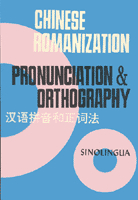 I thought how to write adverbs in Hanyu Pinyin (1.1 MB PDF) would be the logical follow-up to last week’s posting of the rules for verbs.
I thought how to write adverbs in Hanyu Pinyin (1.1 MB PDF) would be the logical follow-up to last week’s posting of the rules for verbs.
Most of these are pretty straightforward, so I won’t discuss much here.
One note: Although reduplicated verbs lose the tone on their second syllable, reduplicated adverbs do not:
- gānggāng 剛剛 (just now)
- jǐnjǐn 僅僅 (only; merely)
- chángcháng 常常 (often)
- shāoshāo 稍稍 (a bit; slightly)
Here are some of the adverbs for which examples are given:
- dōu 都 (all)
- zhǐ 只 (only)
- zuì 最 (most, -est)
- gèng 更 (even more), bǐjiào 比較/比较 (relatively)
- hěn 很 (very), tài 太 (extremely; too)
- gāng 剛/刚 (just now), yǐjing 已經/已经 (already), céngjing 曾經/曾经 (in the past)
- jiù 就 (then), jiāng 將/将 (in the near future)
- cái 才 (finally)
- hái 還/还
- yòu 又 (again; too)
- zài 再 (again)
- yě 也 (also, too)
As always, I recommend this to not just those interested in Pinyin orthography but also to those learning Mandarin (esp. those who are at least at the intermediate level).
